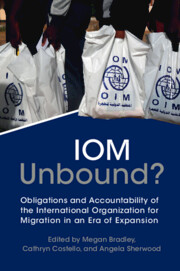Acknowledgements
The publication of this edited collection would not have been possible without the support and hard work of many individuals, and the institutional support of several organizations and funders.
In the first place, thanks are due to Cambridge University Press, and the editors who commissioned and accompanied this collection, namely Finola O’Sullivan, Marianne Nield, and Rachel Imrie. The choice of Cambridge University Press as a publisher for this work was due largely to Finola’s great warmth, support, and encouragement over the years, from the outset of the European Research Council (ERC) project RefMigFootnote * from which the collection emerged.
The RefMig project, of which Professor Cathryn Costello is Principal Investigator, aims to examine the global refugee and migration regimes, casting a spotlight on the evolving role of the International Organization for Migration (IOM) therein. Dr Angela Sherwood worked as a postdoctoral researcher on the RefMig project from 2019 to 2020 at the Refugee Studies Centre, University of Oxford, before taking up a lectureship in Law at Queen Mary University in 2021. While at Queen Mary, Angela’s contribution to the collection was funded by the UK Research and Innovation Economic and Social Research Council. Professor Bradley’s work on the collection was also supported by the Social Sciences and Humanities Research Council of Canada. We are grateful to our funders for enabling our cross-disciplinary approach, bridging legal analysis, and empirical engagement with IOM practices.
Based on an initial stock-taking workshop held at the University of Oxford in February 2019 and our own literature review, we identified the gap in the scholarship on IOM that this volume seeks to fill: rigorous, empirically well-informed assessment of IOM taking into account its legal obligations and current institutional features, including its 2016 Agreement with the UN. We also aimed to bring scholars together who are both informed by and contributing to the burgeoning scholarship on the accountability of international organizations (IOs) in international relations and international legal scholarship generally. Contributors were invited in light of diverse criteria: we sought to invite scholars at all career stages, including several who have made recent important contributions to the scholarship on IOs in general, and those with sectoral expertise on key fields of IOM activity, often inviting them to focus on IOM in particular for the first time. We are grateful to all our contributors, including E. Tendayi Achiume for her insightful foreword. The majority of contributors to this volume came together for an online authors’ workshop in November 2021, and we thank them all for their commitment to this project, their patience, and the expertise and insight they brought to their contributions.
This collection also benefitted from skilled editorial and research assistance throughout. We are grateful in particular to Jara Al-Ali (University of Hamburg) and Mitali Agrawal (Hertie School) for their research and editorial assistance. In addition, we would like to thank the Cambridge University Press reviewers who shared their supportive feedback to further strengthen this project, as well as colleagues who commented on particular chapters and provided insights on particular issues, including Professors Alexandre Skander Galand, Miles Jackson, Orla Lynskey, Linette Taylor, and Ruvi Ziegler.
As well as our funders, we gratefully acknowledge the various institutions that supported the collection. At Oxford, the Refugee Studies Centre (RSC) was the initial home of the RefMig project, while the Centre for Fundamental Rights at the Hertie School supported the work in the final stages, including the online authors’ workshop.
We each owe a deep debt to our families. Most of this editorial work was completed during the COVID-19 pandemic and its aftermath, so we have relied on our partners and others to take on childcare and other carework, to enable our academic work.
* ERC grant RefMig grant under the European Union’s Horizon 2020 research and innovation programme (Grant Agreement ERC STG 2016 REF-MIG (716968).

